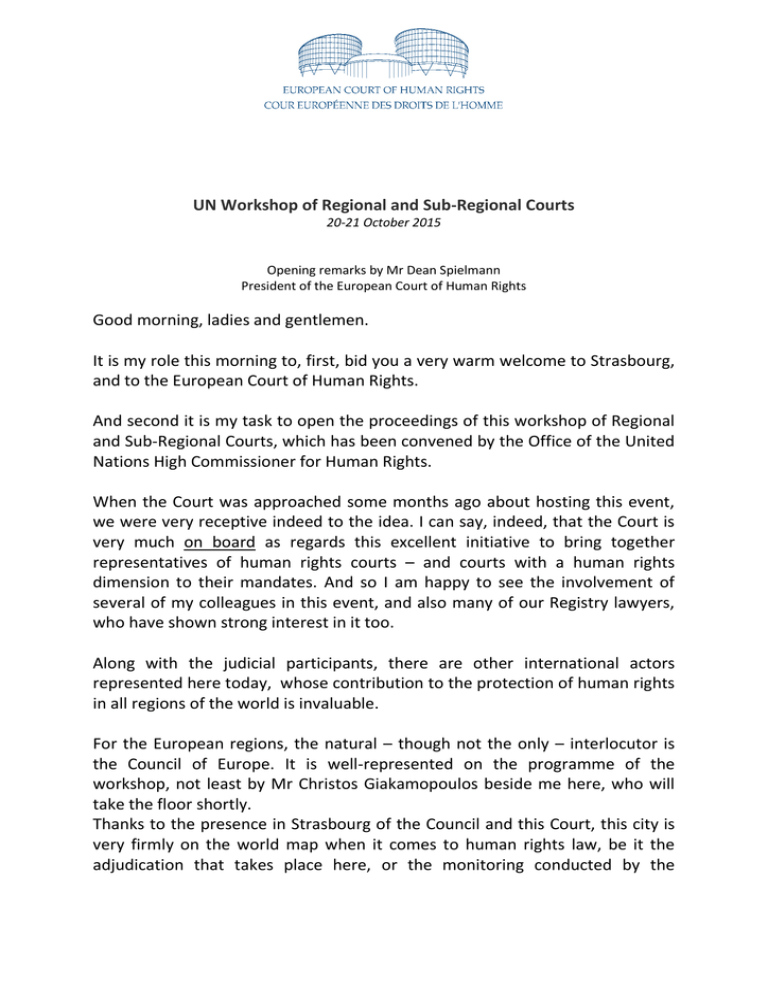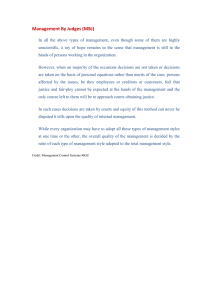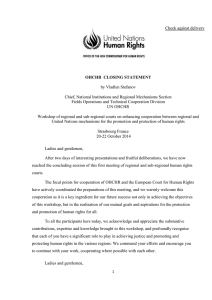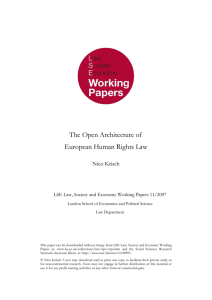UN Workshop of Regional and Sub-Regional Courts
advertisement

UN Workshop of Regional and Sub-Regional Courts 20-21 October 2015 Opening remarks by Mr Dean Spielmann President of the European Court of Human Rights Good morning, ladies and gentlemen. It is my role this morning to, first, bid you a very warm welcome to Strasbourg, and to the European Court of Human Rights. And second it is my task to open the proceedings of this workshop of Regional and Sub-Regional Courts, which has been convened by the Office of the United Nations High Commissioner for Human Rights. When the Court was approached some months ago about hosting this event, we were very receptive indeed to the idea. I can say, indeed, that the Court is very much on board as regards this excellent initiative to bring together representatives of human rights courts – and courts with a human rights dimension to their mandates. And so I am happy to see the involvement of several of my colleagues in this event, and also many of our Registry lawyers, who have shown strong interest in it too. Along with the judicial participants, there are other international actors represented here today, whose contribution to the protection of human rights in all regions of the world is invaluable. For the European regions, the natural – though not the only – interlocutor is the Council of Europe. It is well-represented on the programme of the workshop, not least by Mr Christos Giakamopoulos beside me here, who will take the floor shortly. Thanks to the presence in Strasbourg of the Council and this Court, this city is very firmly on the world map when it comes to human rights law, be it the adjudication that takes place here, or the monitoring conducted by the Organisation’s various supervisory and advisory bodies, or the standard-setting that takes place continuously on the political and inter-governmental side. I would stress, though, that the European region is not turned in on itself. Certainly, there is no shortage of challenges confronting human rights in Europe. The standards that have been agreed and adopted require the constant vigilance of the organs that have been entrusted with the task. As far as the Court is concerned, it is sufficient to look at the continuing stream of judgements that issue each week to see what demands are made, and what expectations rest on, this institution. The very great number of cases pending before the Court are no less eloquent in this regard. The Court’s role is thus a vital one for Europe today. It is sometimes said that the European model can be taken, indeed, as a model. That the standards which are observed and applied here can serve as an inspiration for other regions. That is a gratifying thought, and a very encouraging one too, in the face of the strong opposition that is raised against us from time to time. But I would turn the statement around too, in the sense that this Court takes its inspiration from the human rights acquis of our counterparts elsewhere. I refer in particular to the Inter-American Court of Human Rights. There is a strong axis between Strasbourg and San José. The two Courts are joined by a dialogue that is both judicial and jurisprudential, as well as, on a more concrete level, by exchanges between members of our respective legal staffs. It is only natural to envisage widening that inter-action so as to include other courts that have essential points in common with us. Indeed some years ago there took place in this very room the first summit of the three human rights courts – the African, the Inter-American and the European. This is something I would like to see taken further in the years ahead. The same applies in relation to the other human rights bodies, and I am pleased to see that members of the Registry will be taking part in the focal points meeting that will come after this workshop. Although this is a regional court, the law that it applies is, by its essence , universal. Let’s not forget that the Convention was written as means for European States to – and I quote the Preamble – “take the first steps for the collective enforcement of certain of the rights stated in the Universal Declaration”. There are more steps to take, to develop the scope and strength 2 of human rights norms, and to work to ensure that they are translated into tangible reality for all. The programme that you will follow over the next two days is a rich in content, and focussed as much on practical aspects as purely legal ones. I note in particular that you will have the opportunity to observe this Court at work when you attend the Grand Chamber hearing in the Hutchinson case tomorrow morning. I look forward to greeting you again on that occasion. Now let me turn to Mr Christos Giakamopoulos, Director in the Directorate of Human Rights, to deliver his opening remarks. [after] We will now hear a statement from Mr Gianni Magazzeni of the Office of the High Commissioner for Human Rights. [after] Ladies and gentlemen, it only remains for me to draw this introductory session to a close. I wish you a productive seminar, and an enjoyable visit to Strasbourg. Thank you. 3



